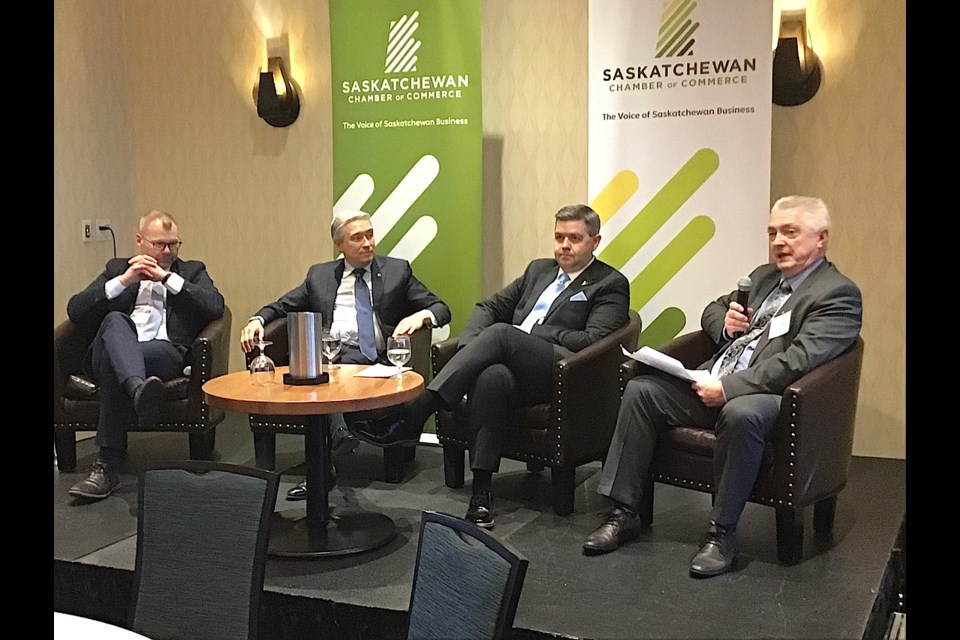REGINA - Ministers from both the federal and provincial government shared the same stage Wednesday for a Fireside Chat hosted by the Saskatchewan Chamber of Commerce.
Federal Minister of Innovation, Science & Industry François-Philippe Champagne, and Saskatchewan provincial Ministers Dustin Duncan, Minister of Crown Investments Corporation, and Jeremy Harrison, Minister of Trade and Export Development, attended the noon hour event put on by the Chamber at Hilton Doubletree in Regina.
The theme was Building a Resilient Economy, with the Chamber stating the discussion was to “explore the realities and necessities of building a resilient economy as we face multiple transitions in regard to critical minerals and the digital industry, the province’s economic opportunities and how Saskatchewan’s companies can lead in the economy of tomorrow.”
Feds and province on the same stage
It seemed like there were times during the presentation that the three ministers might break into a tune of “Kumbaya.”
The acrimonious tone that seemed to accompany federal and provincial relations over the past while was conspicuously absent from this gathering, as the tone from ministers representing the federal Trudeau Liberal government and the Sask Party provincial government was a harmonious one.
Minister Harrison praised Champagne for his “real championing of a lot of the projects that we have moved forward here in this province.”
He pointed as examples to such items as critical minerals, and also uranium.
“We don’t always hear of about all of the work that goes on behind the scenes, and some of the commentary that you see out there, which really is not reflective of in many cases, and I would say almost the majority of cases continues to be a very good working relationship. I think this is a very good example of that.”
Champagne noted that he and Premier Scott Moe had opened the pavilion at COP28 in Dubai. “I think it really made a difference and we showed the world what we had to offer in western Canada,” said Champagne.
Critical minerals
One of the items they were in alignment on was the potential surrounding critical minerals and rare earth metals in the province. Champagne pointed to a recent visit to the Saskatchewan Research Council in Saskatoon and how impressed he was with the potential.
“What we have here in Saskatchewan, and it’s unique in the world, the processing capability for rare earth metals,” he said.
This was not only cutting edge technology in North America but the world, he said, powering batteries and semiconductors.
“The economy of the 21st-century depends on what’s going to come from Saskatoon and Saskatchewan,” said Champagne. “It’s a game changer.”
Minister Duncan noted he had been in Paris for the Global Nuclear exhibition and said the “number of countries and companies that knew about not just Canada’s role but particularly Saskatchewan’s is very encouraging.”
Nuclear
Another topic that was discussed at length were the opportunities in nuclear, and particularly with small nuclear reactors. Ways to speed up the approval process were also discussed.
Duncan said what his government offered to the federal government was “some ideas in terms of how to shorten the timeline when it comes to the nuclear process in terms of regulation.
“We think that they are too long, and there is some redundancy between the impact assessment process, and the Nuclear Safety Commission process, as well as the fact that the provinces including Saskatchewan have a very robust, mature environmental assessment process.”
Duncan saw opportunities to streamline that process and suggested “if we’re building the same thing, then the facility itself should only go through one impact assessment, one process, because we are just essentially just cookie-cutter at a certain point.”
Skills recognition
One other item discussed was the province’s moves towards credentials recognition for those coming to Saskatchewan from other provinces and the rest of the world.
Minister Harrison hinted an announcement was coming in the next three weeks from his ministry, where they would release their strategy on addressing the labour market shortage and on bringing dollars to that. The plan is to put money to an office tasked entirely with working with those who got their credential recognized elsewhere and get it recognized in Saskatchewan.
Harrison said ads would be rolled out urging people who had a skill and wanted it recognized to call them.
"The number one issue across the country, but most acute actually in Saskatchewan, is on the labour shortage, and in making sure we're fully utilizing skills of those who work here."






